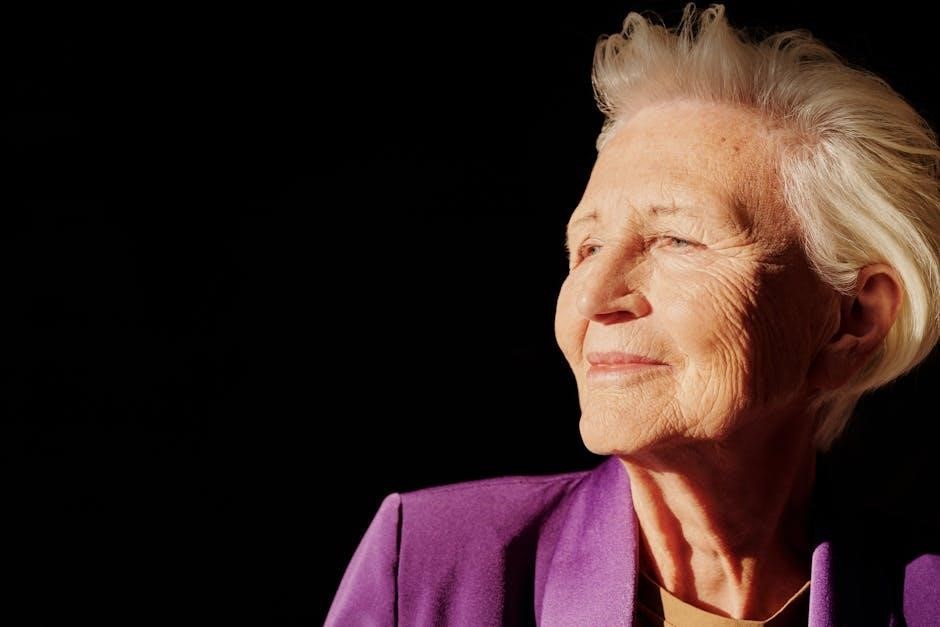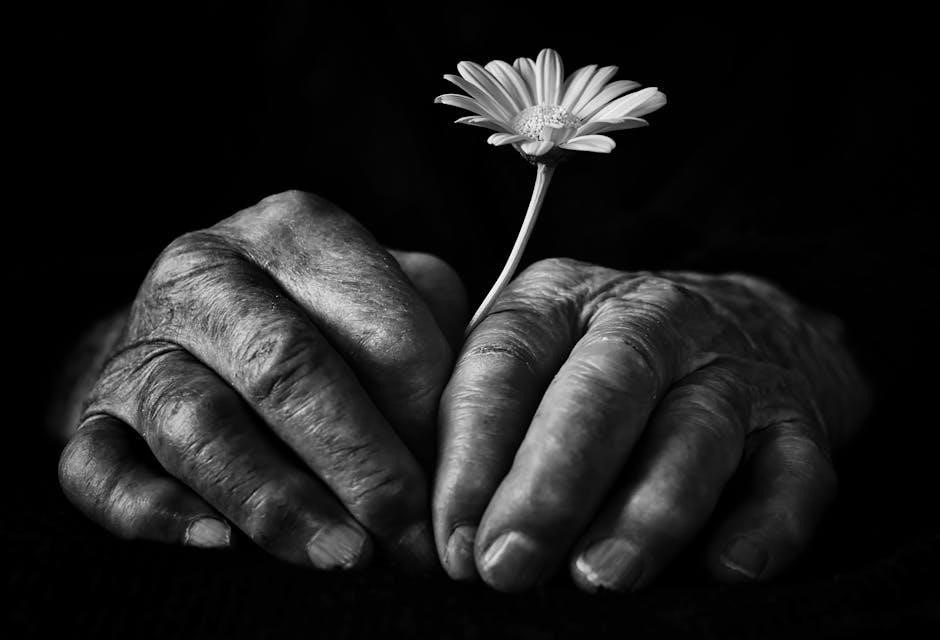Understanding Aging Gracefully
Aging gracefully involves more than just physical appearances; it’s about embracing a mindset and lifestyle that promotes well-being. It’s about adapting to changes, celebrating accomplishments, and maintaining a positive outlook on life, and finding joy in the journey.
Defining Aging Gracefully: Beyond Physical Appearances
Aging gracefully transcends merely minimizing wrinkles or maintaining youthful looks. It’s about cultivating overall well-being, encompassing mental, emotional, and social aspects. This involves accepting the natural changes that come with age, embracing new experiences, and rediscovering sources of joy and fulfillment.
It’s about adjusting expectations, finding new role models, and practicing self-compassion. Furthermore, aging gracefully means staying connected with others, pursuing personal interests, and contributing to society. Ultimately, it’s about living a meaningful life, irrespective of age, and embracing the wisdom and experience gained over the years. It is a mindset and a lifestyle.
The Importance of Mindset and Attitude
A positive mindset significantly influences how we experience aging. Cultivating gratitude, staying open to new experiences, and maintaining social connections contribute to a happier and more fulfilling aging process for everyone.
Cultivating a Positive Outlook on Aging
To foster a positive outlook on aging, practice gratitude by noting things you appreciate daily. Embrace new experiences and remain open to learning and growing, regardless of age. Maintain strong social connections by nurturing relationships with friends and family. Challenge negative thoughts about aging by reframing them into positive affirmations. Focus on personal strengths and accomplishments, recognizing the wisdom gained through experience. Engage in activities that bring joy and fulfillment, prioritizing overall well-being, this can help you to age with grace. Practice self-compassion and acceptance, recognizing that aging is a natural process.

Practical Tips for Healthy Aging
Healthy aging requires a multifaceted approach. Protect your skin, prioritize nutrition, engage in regular exercise, and ensure you get enough sleep. These practical tips help promote physical and mental well-being as you age.
Protecting Your Skin from Environmental Stressors
Shielding your skin from environmental stressors is crucial for graceful aging. As the body’s largest organ, the skin acts as a barrier against the sun and pollution.
Daily sunscreen use is essential to prevent sun damage, which causes premature aging. Choose broad-spectrum sunscreens with SPF 30 or higher;
Limit sun exposure during peak hours and wear protective clothing. Proper hydration also helps maintain skin elasticity.
Incorporate antioxidants into your skincare routine to combat free radicals from pollution. Regular moisturizing prevents dryness. These steps help you protect your skin.
The Role of Nutrition in Graceful Aging
Nutrition plays a pivotal role in graceful aging, impacting both physical and mental well-being. A balanced diet rich in vitamins and minerals supports cellular health and vitality.
Prioritize whole foods, including fruits, vegetables, lean proteins, and healthy fats. Limit processed foods, sugary drinks, and excessive saturated fats.
Adequate hydration is essential for maintaining skin elasticity and overall bodily functions. Consider incorporating supplements to address any nutrient deficiencies.
Mindful eating habits, such as portion control and savoring meals, can enhance the enjoyment of food and support healthy weight management. Good food choices lead to well being.
The Benefits of Regular Exercise for Older Adults
Regular exercise offers numerous benefits for older adults, contributing to physical and mental well-being. It helps maintain muscle mass, bone density, and cardiovascular health, thus reducing the risk of chronic diseases.
Exercise improves balance and coordination, lowering the likelihood of falls. It also enhances cognitive function and mood, combating age-related cognitive decline and depression.
Choose activities that suit your fitness level and preferences, such as walking, swimming, or yoga. Aim for at least 150 minutes of moderate-intensity exercise per week.
Consult your doctor before starting any new exercise program.
Prioritizing Sleep for Physical and Mental Restoration
Prioritizing sleep is crucial for physical and mental restoration as we age. Adequate sleep allows the body to repair itself, clear out waste, and consolidate memories.
Aim for 7-8 hours of quality sleep per night to support cognitive function, mood, and overall health. Establish a regular sleep schedule by going to bed and waking up at the same time each day.
Create a relaxing bedtime routine, avoid caffeine and alcohol before bed, and ensure your bedroom is dark, quiet, and cool.
Address any sleep disorders with a healthcare professional;

Maintaining Social Connections and Engagement
Strong social connections contribute significantly to well-being as we age. Engaging in social activities, maintaining relationships, and building new connections help combat loneliness, promote cognitive health, and enhance overall life satisfaction as one ages.
The Importance of Social Interaction for Well-being
Social interaction is crucial for maintaining mental and emotional health during the aging process. Strong social connections and regular engagement in social activities combat feelings of loneliness and isolation, which can negatively impact overall well-being. Social interaction provides opportunities for intellectual stimulation, emotional support, and a sense of belonging. Staying connected with friends, family, and community groups can enhance cognitive function, reduce stress, and promote a more positive outlook on life. Participating in social events and activities can also provide a sense of purpose and fulfillment, contributing to a happier and healthier aging experience as time progresses.
Embracing Self-Care and Self-Love
Embracing self-care and self-love involves prioritizing your physical, mental, and emotional well-being. It’s about treating yourself with kindness, compassion, and respect, acknowledging your worth, and nurturing your overall health.
Practicing Kindness and Acceptance Towards Yourself
Practicing kindness and acceptance toward yourself is vital for aging gracefully. It entails treating yourself with the same compassion you would offer a dear friend. Recognize that imperfections are part of being human and embrace your unique qualities. Refrain from harsh self-criticism; instead, cultivate self-compassion.
Acknowledge your strengths and accomplishments, and forgive yourself for past mistakes. Focus on your positive attributes and celebrate your growth and resilience. Engage in activities that bring you joy and nourish your soul. Prioritize self-care practices that promote well-being. Remember that you deserve love and kindness, especially from yourself. Embrace self-acceptance as a path to inner peace and contentment.

Adjusting Expectations and Finding New Role Models
Adjusting expectations involves re-evaluating personal goals and embracing authenticity. Finding new role models means seeking inspiration from individuals who embody grace, resilience, and self-acceptance at any age, and learning from them.
Re-evaluating Personal Expectations and Embracing Authenticity
As we age, it’s vital to re-evaluate our expectations, letting go of unrealistic ideals of youthfulness. Embrace the authenticity that comes with experience and age. Focus on inner qualities, like wisdom, resilience, and kindness, rather than external appearances. Understand that aging is a natural process, not something to be feared or resisted.
Accepting ourselves as we are, with all our imperfections and changes, fosters self-love and contentment. This shift in perspective allows us to find joy in the present moment and appreciate the unique beauty of each stage of life and grow old gracefully.

Addressing Challenges and Seeking Support
Aging can present medical, emotional, and social obstacles. Seeking support from healthcare professionals, therapists, or support groups is crucial. Addressing these challenges proactively ensures a higher quality of life.
Overcoming Medical, Emotional, and Social Obstacles
As we age, we may encounter various challenges that impact our well-being. Medical issues, such as chronic illnesses and physical limitations, can affect our ability to maintain independence and enjoy life. Emotional challenges, like loneliness, depression, and grief, can arise from loss of loved ones or changes in social roles. Social obstacles, such as ageism and limited access to resources, can lead to isolation and decreased participation in community life.
Overcoming these obstacles requires proactive strategies, including seeking medical care, engaging in therapy or counseling, joining support groups, and advocating for age-friendly policies.
